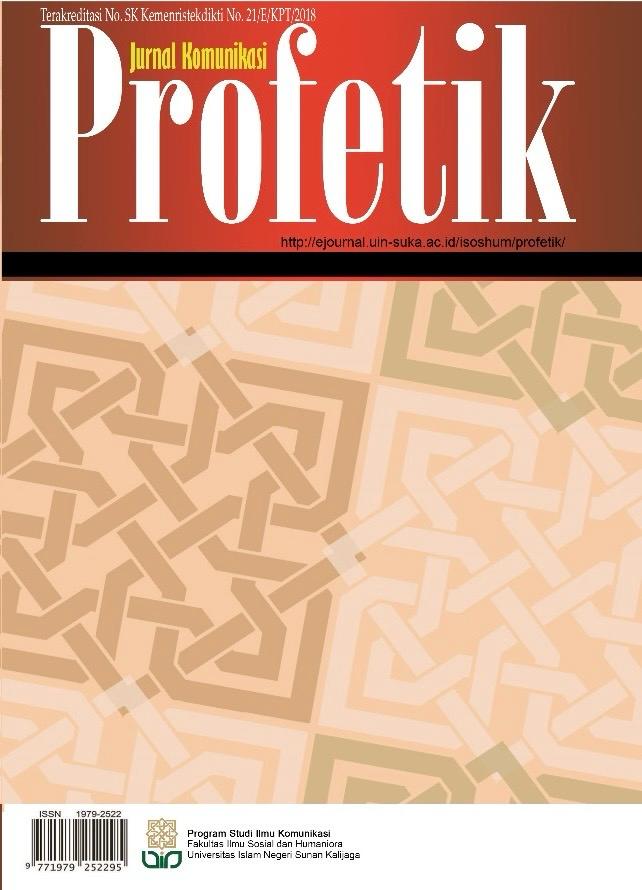Scroll and Shop: Exploring Online Shopping Culture in the Digital Media Era
Main Article Content
Abstract
The purpose of this paper is to describe the phenomenon of widespread use of online shopping platforms, which is framed as consumption behavior in media culture. The phenomenological method was used in this study, which involved four informants who were interviewed in-depth about their experiences with online shopping platforms. According to the studies, even though informants could use online shopping applications, some still saw it as an alternative to traditional shopping practices. In contrast, others indicated that online shopping had become their daily behavior. Additionally, the study highlights that although informants recognize the benefits and convenience of online shopping, they are also aware of its drawbacks. This awareness underscores the need for consumers to be cognizant of the risks associated with online shopping activities. As online shopping becomes increasingly popular, it remains essential to carefully consider its advantages and disadvantages to avoid potential problems. Overall, the study provides insights into how online shopping is perceived and utilized, emphasizing the importance of balancing its benefits with the awareness of its inherent risks.
Article Details
License
Please find the rights and licenses in Profetik: Jurnal Komunikasi by submitting the article/manuscript of the article, the author(s) agree with this policy. No specific document sign-off is required.
1. License
The non-commercial use of the article will be governed by the Creative Commons Attribution license as currently displayed on Creative Commons Attribution-NonCommercial 4.0 International License

2. Author(s)' Warranties
The author warrants that the article is original, written by stated author(s), has not been published before, contains no unlawful statements, does not infringe the rights of others, is subject to copyright that is vested exclusively in the author and free of any third party rights, and that any necessary written permissions to quote from other sources have been obtained by the author(s).
3. User/Public Rights
Profetik's spirit is to disseminate articles published are as free as possible. Under the Creative Commons license, Profetik permits users to copy, distribute, display, and perform the work for non-commercial purposes only. Users will also need to attribute authors and Profetik on distributing works in the journal and other media of publications. Unless otherwise stated, the authors are public entities as soon as their articles got published.
4. Rights of Authors
Authors retain all their rights to the published works, such as (but not limited to) the following rights;
Copyright and other proprietary rights relating to the article, such as patent rights, The right to use the substance of the article in own future works, including lectures and books, The right to reproduce the article for own purposes, The right to self-archive the article (please read out deposit policy), The right to enter into separate, additional contractual arrangements for the non-exclusive distribution of the article's published version (e.g., post it to an institutional repository or publish it in a book), with an acknowledgment of its initial publication in this journal (Profetik: Jurnal Komunikasi).
5. Co-Authorship
If the article was jointly prepared by more than one author, any authors submitting the manuscript warrants that he/she has been authorized by all co-authors to be agreed on this copyright and license notice (agreement) on their behalf, and agrees to inform his/her co-authors of the terms of this policy. Profetik will not be held liable for anything that may arise due to the author(s) internal dispute. Profetik will only communicate with the corresponding author.
6. Royalties
Being an open accessed journal and disseminating articles for free under the Creative Commons license term mentioned, author(s) aware that Profetik entitles the author(s) to no royalties or other fees.
7. Miscellaneous
Profetik will publish the article (or have it published) in the journal if the article’s editorial process is successfully completed. Profetik's editors may modify the article to a style of punctuation, spelling, capitalization, referencing and usage that deems appropriate. The author acknowledges that the article may be published so that it will be publicly accessible and such access will be free of charge for the readers as mentioned in point 3.
References
Alia, C. S., Sukma, S. N., & Mandasari, R. I. M. (2021). FunRecite: Aplikasi Belajar Mengaji Al-Quran untuk Anak berbasis Augmented Reality. E-Proceeding of Applied Science Vol.7, No.5, 2003–2007. Bandung: Telkom University.
Baudrillard, J. P. (2011). Masyarakat Konsumsi (terj.). Yogyakarta: Kreasi Wacana.
Fakhruroji, M. (2021). Mediatisasi Agama: Konsep, Kasus, dan Implikasi. Bandung: LEKKAS.
Fakhruroji, M., & Muchtar, K. (2018). Campaigning #golkarsolid: Branding Image Strategy of Golkar Party on Social Media. 260, 210–214. Atlantis Press.
Fantini, E., & Tamba, R. S. (2020). Mediamorfosis Edukasi Informal Online melaui Platform Digital sebagai Peluang Bisnis Baru. Majalah Ilmiah Bijak, 17(1), 114–127.
Hanifah, N., & Rahadi, D. R. (2020). Analisis Perilaku Konsumen dalam Memutuskan Pembelian secara Online pada Masa Pandemi COVID-19. Sultanist: Jurnal Manajemen Dan Keuangan, 8(2), 112–122.
Ibrahim, I. S., & Akhmad, B. A. (2014). Komunikasi & Komodifikasi: Mengkaji Media dan Budaya dalam Dinamika Globalisasi. Jakarta: Yayasan Pustaka Obor Indonesia.
Juditha, C., & Darmawan, J. J. (2018). Penggunaan Media Digital dan Partisipasi Politik Generasi Milenial. Jurnal Penelitian Komunikasi Dan Opini Publik, 22(2), 17. https://doi.org/doi:10.33299/jpkop.22.2.1628.
Kellner, D. (2010). Budaya Media: Cultural Studies, Identitas dan Politik antara Modern dan Postmodern (Translated). Yogyakarta: Jalasutra.
Koentjaraningrat. (1990). Sejarah Teori Antropologi II. Jakarta: Universitas Indonesia Press.
Piliang, Y. A. (2012). Masyarakat Informasi dan Digital: Teknologi Informasi dan Perubahan Sosial. Jurnal Sosioteknologi, 11(27), 147–148.
Safitri, N. (2020). Aplikasi Smart Moeslim sebagai Evaluasi Ibadah Harian (Mutaba’ah Yaumiah) berbasis Android. Universitas Islam Negeri Sultan Syarif Kasim Riau.
Sazali, H., & Rozi, F. (2020). Belanja Online dan Jebakan Budaya Hidup Digital pada Masyarakat Milenial. Jurnal Simbolika, 6(2), 85–95. https://doi.org/10.31289/simbollika.v6i2.3556
